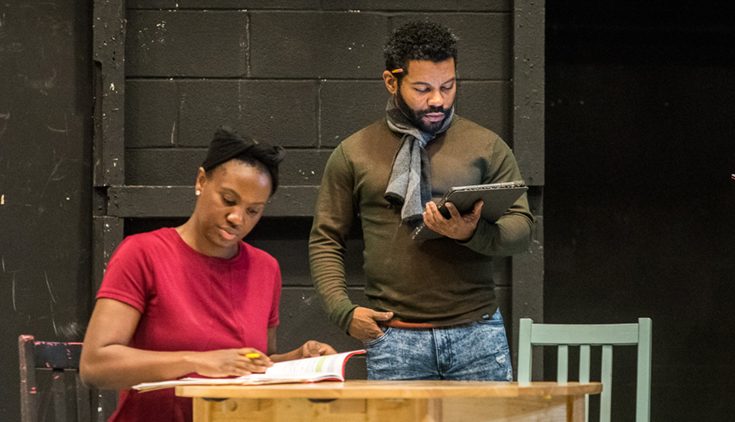In the early 1960s, African American Pulitzer Prize-winning poet Gwendolyn Brooks walked past seven boys at a pool hall, an experience she commemorated in the poem “We Real Cool”:
We real cool. We / Left school. We / Lurk late. We / Strike straight. We / Sing sin. We / Thin gin. We / Jazz June. We / Die soon.
When read aloud, the “we” at the end of each line fades to near-nothingness, a deliberate affectation that Brooks said in a 1970 interview was meant to signify the boys’ questioning of their own existence.
That doubt comes to life in Dominique Morisseau’s Pipeline, named for the American “school-to-prison pipeline” that funnels children, especially children of color, from public schools into the criminal justice system. Under the direction of David Vaughn Straughn, the play is being staged at Live Arts from January 14-30.
In her first major role at Live Arts, Aiyana Marcus leads the cast as Nya, a public high school teacher whose efforts to remove her Black son Omari (Asyra Cunningham) from the ominous pipeline seem in vain when he gets into a fight at his predominantly white private school. The conflict starts him down a path that Nya worries will lead him to the doom Brooks predicted in her haunting poem.
“The cast is really great,” says Marcus. “Everyone shows up really ready to work, and really connected to the roles even from our very first reading. I felt that connection with the actor that plays Omari, my son in the show, and everyone seems to have a connection with the language and with their own characters.”
Rounding out the cast are Tanaka Maria, Sarad Davenport, and Jamie Virostko. Brooks’ “We Real Cool” plays such a big role that Marcus considers it “almost a character” in its own right. The poem is woven throughout the production as a haunting backdrop, somewhere between premonition and echo, along with the characters’ struggles.
Nya first brings the poem to the stage when she writes the words on a chalkboard for her students; later, Omari raises the same aching question as the pool players, faltering on the word “we” as he searches for belonging within two types of academic institutions, both of which threaten to fail him.
“It’s a deep process, I think because a lot of us have some sort of proximity or closeness to the characters that we play,” says Marcus. “There’s a certain amount of labor that comes with that. For us, it’s a story, but it’s also a piece of our own lives. It’s not just, ‘Oh, we did this piece of theater;’ it could have, hopefully, very real consequences in our lives and the lives of people who look like us, and can really make a difference.”
